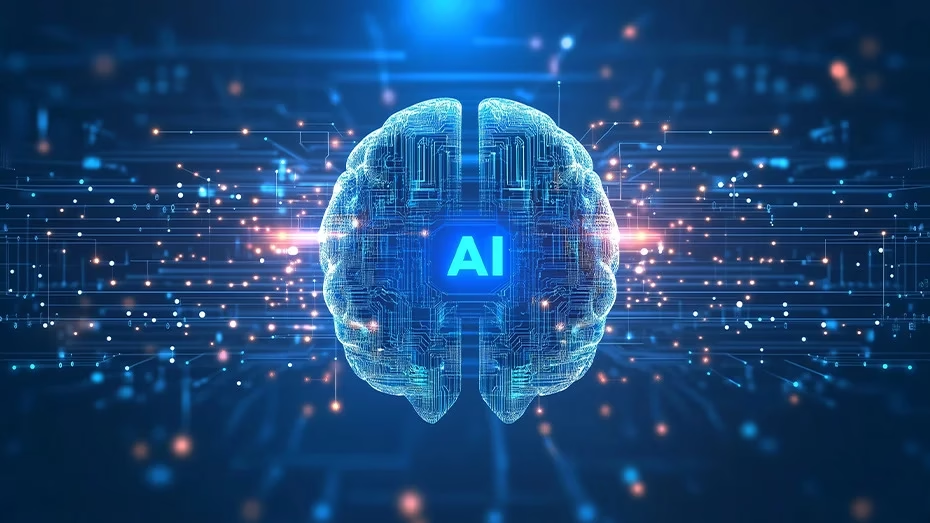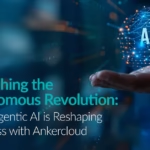“`html
AI Breakthroughs in 2025: A Pivotal Year for Artificial Intelligence
Estimated reading time: 10 minutes
Key Takeaways
- 2025 is marked by unprecedented acceleration in AI development, particularly in model efficiency and scientific discovery.
- Significant breakthroughs include DeepSeek’s R1 Model, advanced healthcare AI like Delphi-2M, and non-invasive AI co-pilots.
- Key AI technology trends include Generative & Multimodal AI, Explainable AI (XAI), Ethical AI, Edge AI, AI for Scientific Discovery, and Quantum AI.
- The future of AI promises transformative automation, personalized digital twins, and deep integration into all systems.
- AI’s impact on industries like healthcare, finance, manufacturing, retail, education, and entertainment is profound and rapidly growing.
- Navigating the evolving AI landscape requires continuous learning, strategic investment, and a strong ethical compass.
Table of contents
- AI Breakthroughs in 2025: A Pivotal Year for Artificial Intelligence
- Key Takeaways
- Unpacking the Landmark AI Breakthroughs of 2025
- Key AI Technology Trends Shaping Tomorrow
- Charting the Future of AI: Possibilities and Projections
- The Transformative Impact of AI on Industries
- Strategies for Navigating the Evolving AI Landscape
- Frequently Asked Questions
The pace of innovation in artificial intelligence is nothing short of astounding. What once seemed like science fiction is rapidly becoming our reality, and the year 2025 is proving to be a pivotal moment in this accelerating journey. We are witnessing remarkable progress, with AI not only becoming more powerful but also more efficient, accessible, and integrated into the fabric of our lives. This post aims to provide an in-depth understanding of the *latest AI news 2025*, explore the most significant *AI technology trends*, and delve into the broader *future of AI* and its multifaceted *impact of AI on industries*. Indeed, AI is accelerating at an unprecedented pace in 2025, marked by remarkable breakthroughs in model efficiency, scientific discovery, healthcare, and foundational shifts in how technology is integrated across industries (Source: [https://www.crescendo.ai/news/latest-ai-news-and-updates](https://www.crescendo.ai/news/latest-ai-news-and-updates) & [https://hai.stanford.edu/ai-index/2025-ai-index-report](https://hai.stanford.edu/ai-index/2025-ai-index-report)).

Unpacking the Landmark AI Breakthroughs of 2025
The year 2025 has delivered a series of significant *AI breakthroughs in 2025*, pushing the boundaries of what we thought was possible. These advancements are not just incremental; they represent foundational shifts in AI capabilities and applications.
One of the most striking developments is **DeepSeek’s R1 Model**. This model has achieved state-of-the-art language performance, a remarkable feat in itself. However, what truly sets it apart is its drastic reduction in training costs – reportedly 70% less than comparable U.S. models. This achievement is attributed to proprietary hardware and sophisticated optimizations, effectively challenging Western dominance in the large model space and setting new benchmarks for scalable and cost-efficient AI development (Source: [https://www.crescendo.ai/news/latest-ai-news-and-updates](https://www.crescendo.ai/news/latest-ai-news-and-updates)).

In the realm of healthcare, the progress has been nothing short of revolutionary. The **Delphi-2M model** now possesses the astounding capability to map out disease progression for over 1,200 diseases, predicting trajectories decades into the future by analyzing massive medical datasets. Complementing this is the advent of miniature AI-powered cardiac imaging cameras. These devices can detect hidden coronary risks in real-time, heralding a significant revolution in diagnostics and preventative care (Source: [https://www.crescendo.ai/news/latest-ai-news-and-updates](https://www.crescendo.ai/news/latest-ai-news-and-updates)).
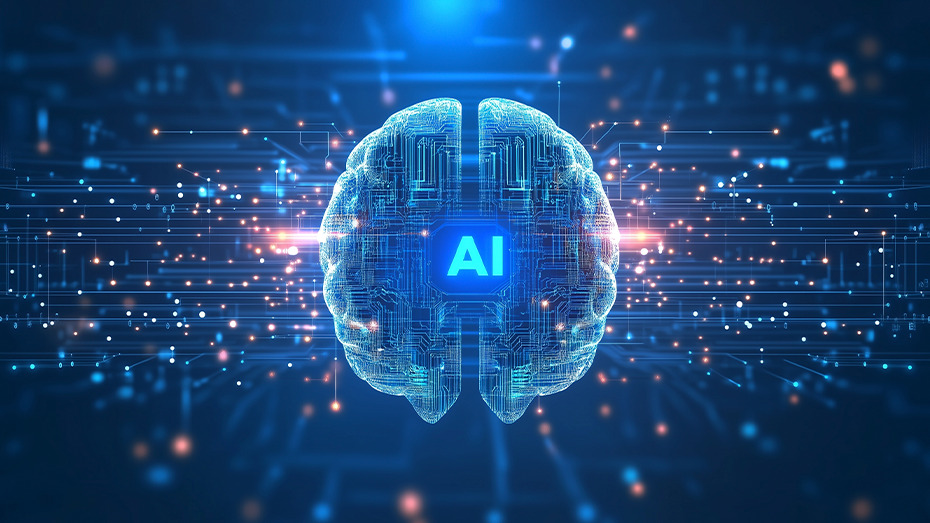
Another leap forward comes in the form of **Non-Invasive AI Co-Pilots**. Researchers at UCLA have developed wearable brain-computer interfaces (BCIs) enhanced by AI. These systems allow both healthy individuals and those with paralysis to control devices and robots with significantly greater effectiveness and accessibility, making BCI technology safer and more user-friendly (Source: [https://www.crescendo.ai/news/latest-ai-news-and-updates](https://www.crescendo.ai/news/latest-ai-news-and-updates)).

The impact of AI extends to critical fields like materials science and energy. AI is dramatically accelerating the discovery of new battery chemistries, paving the way for the development of promising new materials that are crucial for energy storage and sustainability (Source: [https://www.crescendo.ai/news/latest-ai-news-and-updates](https://www.crescendo.ai/news/latest-ai-news-and-updates)).

In the ongoing battle against misinformation, the development of a **Universal Deepfake Detector** is a significant achievement. This detector boasts an impressive 98% accuracy rate in identifying both video and audio deepfakes, offering a vital tool in combating the spread of synthetic media and disinformation (Source: [https://www.crescendo.ai/news/latest-ai-news-and-updates](https://www.crescendo.ai/news/latest-ai-news-and-updates)).

These advancements collectively form the core of the *latest AI news 2025*, showcasing rapid progress in generative models, scientific computing, and the practical application of AI across diverse domains.

Key AI Technology Trends Shaping Tomorrow
Beyond specific breakthroughs, several overarching *AI technology trends* are defining the trajectory of artificial intelligence in 2025 and beyond. These trends are not isolated; they often intersect and amplify each other’s impact.
**Generative & Multimodal AI** continues to be a major focus, attracting substantial private investment. This investment is fueling innovation in tools for creating and manipulating language, video, and designs, making creative processes more accessible and efficient (Source: [https://hai.stanford.edu/ai-index/2025-ai-index-report](https://hai.stanford.edu/ai-index/2025-ai-index-report)).
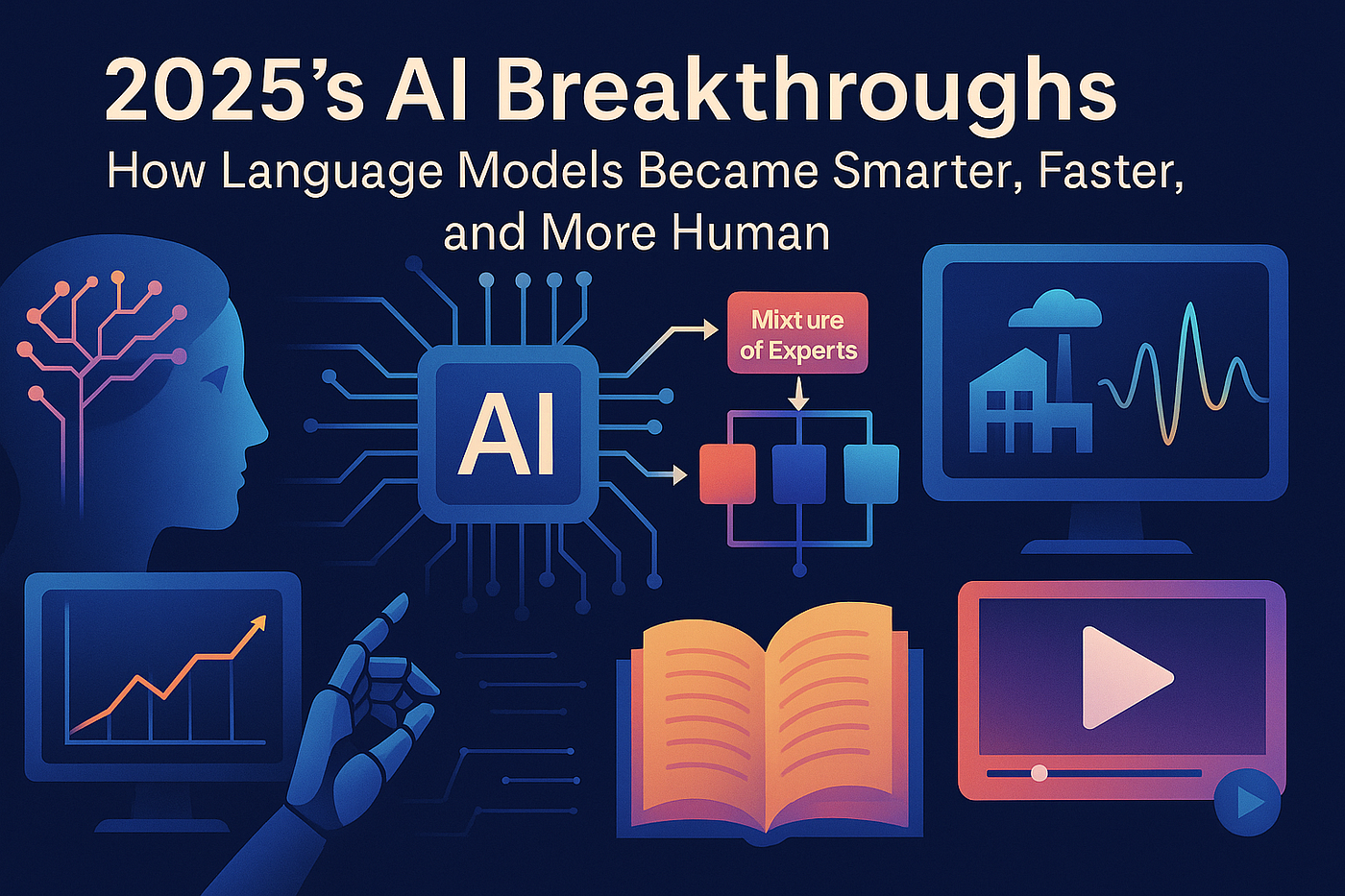
**Explainable AI (XAI)** is gaining prominence as the rollout of transparency and interpretability technologies aims to build greater trust in AI decisions. This is particularly crucial in sensitive sectors like healthcare and finance, where understanding the reasoning behind AI recommendations is paramount (Source: [https://explodingtopics.com/blog/future-of-ai](https://explodingtopics.com/blog/future-of-ai)).
**Ethical and Responsible AI** is also growing. As AI deployment expands, there’s an increasing corporate focus on fairness, mitigating bias, ensuring privacy safeguards, and adhering to evolving regulatory compliance standards (Source: [https://explodingtopics.com/blog/future-of-ai](https://explodingtopics.com/blog/future-of-ai)).
**Edge AI** represents a significant trend towards optimizing AI models to run directly on devices, locally. This enables real-time applications in sectors such as automotive, smart homes, and wearables. Xiaomi’s in-car AI voice assistant is a prime example of this shift towards decentralized intelligence (Sources: [https://www.crescendo.ai/news/latest-ai-news-and-updates](https://www.crescendo.ai/news/latest-ai-news-and-updates) & [https://explodingtopics.com/blog/future-of-ai](https://explodingtopics.com/blog/future-of-ai)).

**AI for Scientific Discovery** is revolutionizing research. AI-powered laboratories and research centers are dramatically accelerating breakthroughs in mathematics, physics, and biology, achieving in weeks what would have previously taken years of human effort (Sources: [https://www.crescendo.ai/news/latest-ai-news-and-updates](https://www.crescendo.ai/news/latest-ai-news-and-updates) & [https://www.youtube.com/watch?v=Ax0LhF4s_CA](https://www.youtube.com/watch?v=Ax0LhF4s_CA)).
Finally, **Quantum AI** is emerging as a frontier where quantum computing and AI converge. This synergy holds the potential to solve previously intractable problems in chemistry, security, and optimization, hinting at significant future disruptions (Source: [https://www.youtube.com/watch?v=Ax0LhF4s_CA](https://www.youtube.com/watch?v=Ax0LhF4s_CA)). These trends are interconnected, illustrating the dynamic and evolving nature of AI development.

Charting the Future of AI: Possibilities and Projections
Looking ahead, the *future of AI* is painted with strokes of transformative potential, fueled by the accelerating breakthroughs and emerging trends. The possibilities extend far beyond current applications, promising a fundamental reshaping of how we live and work.
One of the most significant projected changes is **Transformative Automation**. Advanced AI systems are poised to manage increasingly complex workflows, spanning scientific research, legal processes, engineering tasks, and even creative endeavors. This level of automation could free up human potential for higher-level strategic thinking and innovation (Sources: [https://www.youtube.com/watch?v=Ax0LhF4s_CA](https://www.youtube.com/watch?v=Ax0LhF4s_CA) & [https://explodingtopics.com/blog/future-of-ai](https://explodingtopics.com/blog/future-of-ai)).

The concept of **Personal Digital Twins** is also gaining traction. Imagine individuals leveraging AI-powered simulators to explore life choices, test investment strategies, analyze health risks, and optimize daily decision-making. This personalized AI guidance could empower individuals to make more informed and effective choices (Source: [https://www.youtube.com/watch?v=Ax0LhF4s_CA](https://www.youtube.com/watch?v=Ax0LhF4s_CA)).
The vision for 2025 and beyond includes the **Ubiquity and Integration** of AI. AI is expected to become deeply embedded, often invisibly, within major systems. This proactive integration aims to address issues like potential equipment failures, impending health alerts, or supply chain disruptions before they even impact users (Sources: [https://www.youtube.com/watch?v=Ax0LhF4s_CA](https://www.youtube.com/watch?v=Ax0LhF4s_CA) & [https://explodingtopics.com/blog/future-of-ai](https://explodingtopics.com/blog/future-of-ai)).

The **Long-term Impact** of these advancements is expected to be profound. We are looking at a fundamental reshaping of labor markets, the methodologies employed in scientific research, the processes of policy formulation, and the very structure of various industries. This necessitates a proactive approach to adaptation and education.
The Transformative Impact of AI on Industries
The *impact of AI on industries* is not a distant prospect; it is a present reality that is rapidly accelerating. AI is revolutionizing virtually every sector, driving efficiency, enabling new capabilities, and reshaping business models.
In **Healthcare**, AI is already making significant strides in early disease detection, the development of personalized medicine, real-time diagnostics, and optimizing overall healthcare operations. The potential for AI to improve patient outcomes and reduce healthcare costs is immense (Sources: [https://www.crescendo.ai/news/latest-ai-news-and-updates](https://www.crescendo.ai/news/latest-ai-news-and-updates), [https://www.youtube.com/watch?v=Ax0LhF4s_CA](https://www.youtube.com/watch?v=Ax0LhF4s_CA), & [https://explodingtopics.com/blog/future-of-ai](https://explodingtopics.com/blog/future-of-ai)).
The **Finance** sector is witnessing AI drive sophisticated algorithmic trading, enhance risk assessment and fraud detection capabilities, and enable the creation of highly personalized banking products. The emergence of fully AI-run banks is on the horizon, signaling a paradigm shift (Sources: [https://www.artificialintelligence-news.com](https://www.artificialintelligence-news.com) & [https://explodingtopics.com/blog/future-of-ai](https://explodingtopics.com/blog/future-of-ai)).
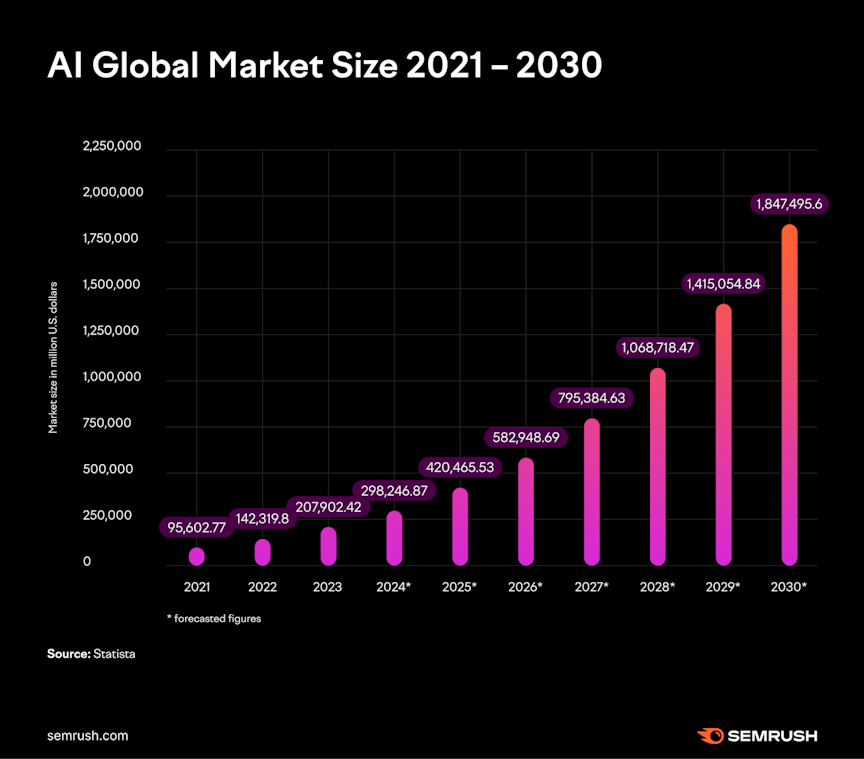
**Manufacturing** is being transformed by AI-driven robotic automation and intelligent supply chain management, leading to reduced costs and significantly increased production efficiency. Predictive maintenance powered by AI is also minimizing downtime and optimizing resource allocation.
In **Retail**, AI is personalizing marketing strategies, optimizing inventory control with unprecedented accuracy, and enhancing customer engagement across both online and physical channels. Personalized recommendations and smart assistants are becoming standard.
The **Education** sector is benefiting from adaptive AI tutors that tailor learning experiences to individual student needs and universal translation tools that facilitate cross-border collaboration and access to knowledge.
**Entertainment** is being fundamentally altered by generative AI, which is revolutionizing content creation, curation, and distribution processes, opening up new avenues for creativity and personalized experiences (Sources: [https://hai.stanford.edu/ai-index/2025-ai-index-report](https://hai.stanford.edu/ai-index/2025-ai-index-report) & [https://explodingtopics.com/blog/future-of-ai](https://explodingtopics.com/blog/future-of-ai)).

These industry-specific impacts are directly linked to the acceleration driven by *AI breakthroughs in 2025*. The emergence of new business models, unprecedented efficiencies, and a critical need for workforce adaptation and robust regulatory oversight are defining characteristics of this era.
Strategies for Navigating the Evolving AI Landscape
As AI continues its relentless advance, individuals and organizations must adopt proactive strategies to effectively navigate this dynamic landscape. Staying ahead requires a blend of continuous learning, strategic foresight, and a commitment to ethical principles.
A cornerstone strategy is **Emphasizing Continuous Learning**. The rapid evolution of AI necessitates ongoing education and upskilling for both individuals and organizations. Developing strong digital literacy is no longer optional but essential to keep pace with AI advancements and leverage them effectively (Source: [https://explodingtopics.com/blog/future-of-ai](https://explodingtopics.com/blog/future-of-ai)).
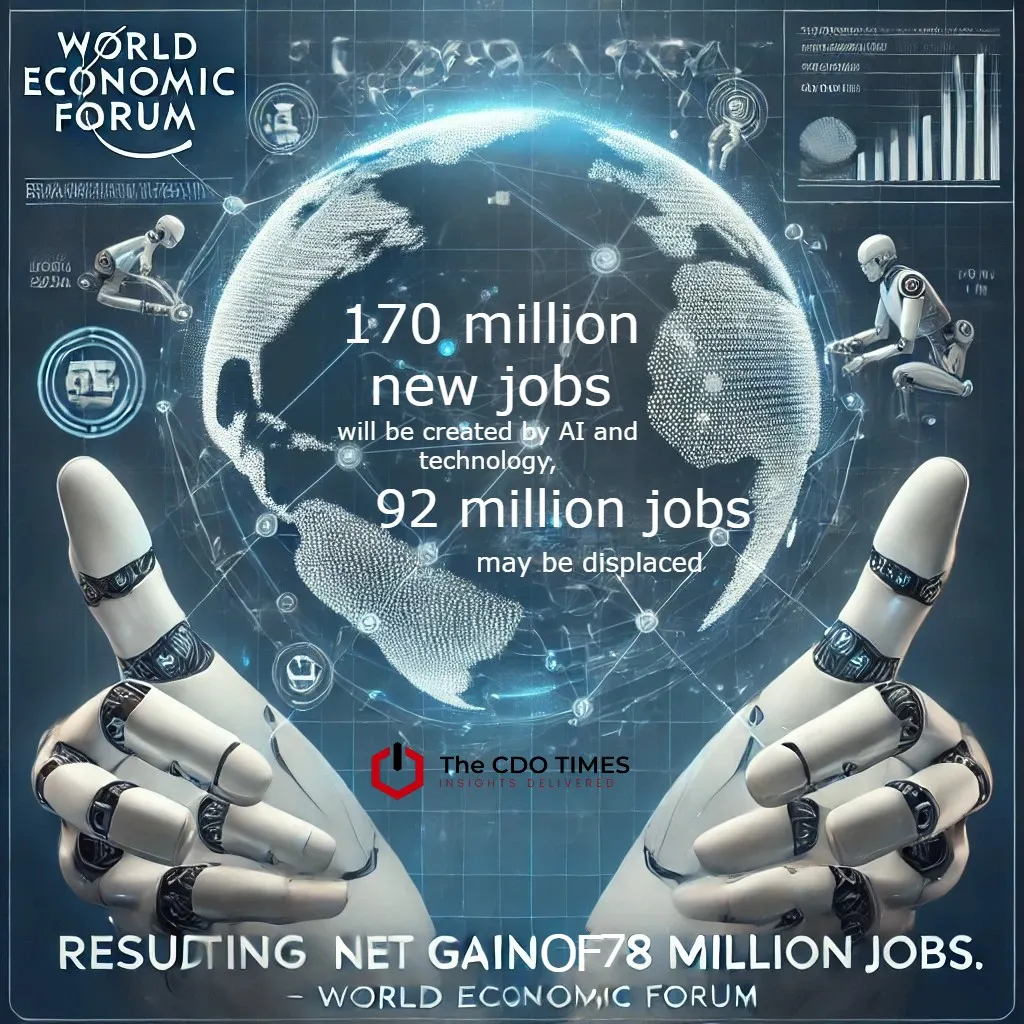
For businesses, **Advising Strategic Investment** is paramount. This involves proactively investing in AI readiness, establishing robust ethical AI infrastructure, and forging partnerships with leading AI innovators. Such investments can secure a competitive advantage and foster sustainable growth (Sources: [https://hai.stanford.edu/ai-index/2025-ai-index-report](https://hai.stanford.edu/ai-index/2025-ai-index-report) & [https://explodingtopics.com/blog/future-of-ai](https://explodingtopics.com/blog/future-of-ai)).
Crucially, a **Call for Ethical Foresight** is needed. Policymakers and companies must strike a delicate balance between fostering innovation and upholding ethical responsibilities. As AI’s influence grows in critical areas like health, finance, and public trust, maintaining this balance is vital for ensuring AI serves humanity’s best interests (Source: [https://explodingtopics.com/blog/future-of-ai](https://explodingtopics.com/blog/future-of-ai)).
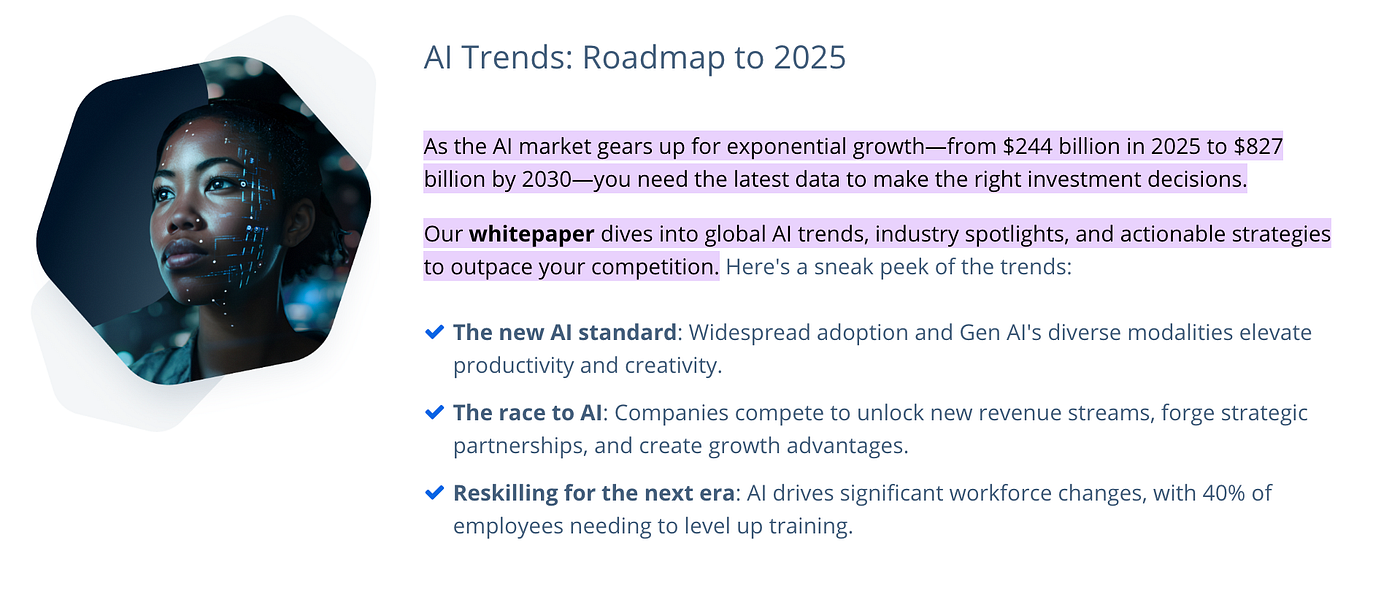
Frequently Asked Questions
Q1: What are the most significant AI breakthroughs expected in 2025?
The most significant AI breakthroughs in 2025 include advancements in model efficiency like DeepSeek’s R1, revolutionary healthcare AI such as Delphi-2M for disease prediction and AI-powered cardiac imaging, and the development of safer, more effective non-invasive AI co-pilots. AI is also accelerating discoveries in materials science and energy, and improving detection methods for deepfakes.
Q2: Which AI technology trends should I be aware of in 2025?
Key AI technology trends in 2025 include the continued rise of Generative & Multimodal AI, the increasing importance of Explainable AI (XAI) for trust, a strong focus on Ethical and Responsible AI, the expansion of Edge AI for on-device processing, AI’s accelerated role in Scientific Discovery, and the emerging synergy of Quantum AI.
Q3: How will AI impact industries in the coming years?
AI will profoundly impact industries by revolutionizing healthcare through advanced diagnostics and personalized medicine; transforming finance with AI-driven trading and fraud detection; optimizing manufacturing with automation and supply chain management; personalizing retail experiences; enhancing education with adaptive tutors; and reshaping entertainment through generative AI content creation.
Q4: What is the future outlook for AI development?
The future outlook for AI is one of transformative automation, personalized digital twins for decision-making, and deep, often invisible, integration into all major systems. This will lead to a fundamental reshaping of labor markets, scientific research, policy, and the structure of industries, making continuous adaptation and ethical considerations crucial.
Q5: How can individuals and organizations prepare for the future of AI?
Preparation involves embracing continuous learning and upskilling, making strategic investments in AI readiness and infrastructure, and maintaining a strong focus on ethical foresight. Staying informed about the latest AI news and trends is essential for navigating the evolving landscape and capitalizing on opportunities while mitigating risks.

“`


